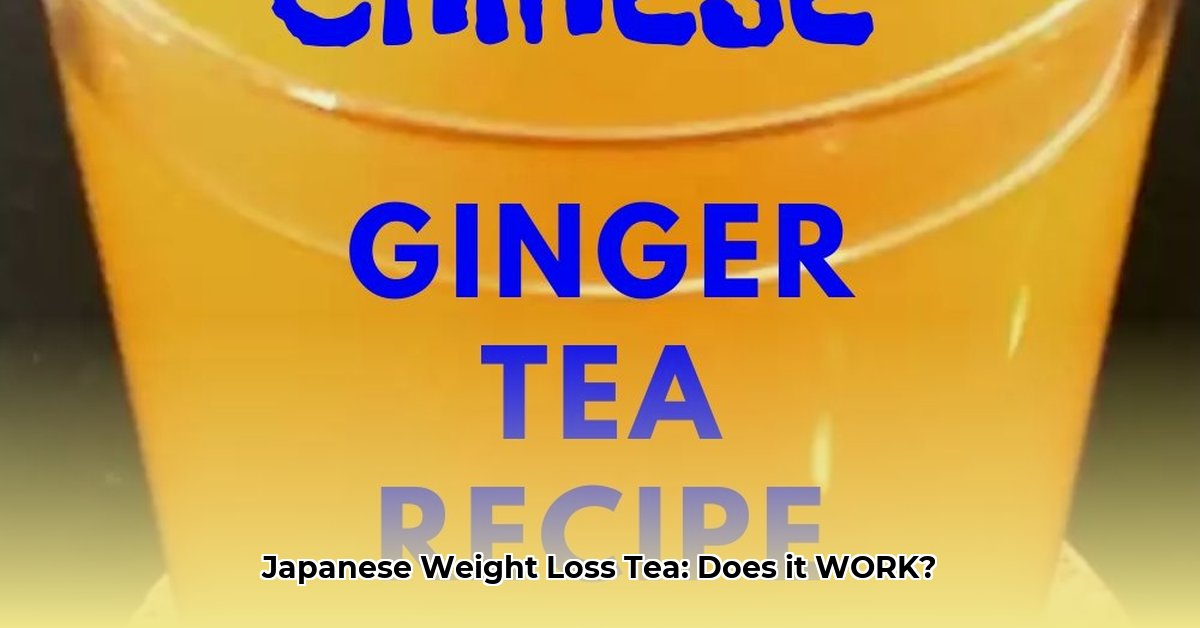
Japanese Weight Loss Tea: Separating Fact from Fiction
The quest for effective weight loss solutions often leads to exploring various methods, from trendy "natural" alternatives to traditional remedies. Recently, the internet has buzzed with claims surrounding "natural Mounjaro" drinks and the purported benefits of Japanese diet teas. This review objectively compares these two approaches, evaluating their efficacy and potential risks to help you make informed decisions. Crucially, we'll emphasize the importance of consulting a healthcare professional before embarking on any weight-loss journey.
Decoding the "Natural Mounjaro" Hype
Numerous online sources promote "natural Mounjaro" drinks, typically blends of ingredients like ginger, lemon, and apple cider vinegar. These concoctions promise weight-loss results comparable to the prescription medication Mounjaro. However, this claim lacks scientific substantiation. While individual components may offer some health benefits (e.g., ginger's aid in digestion), they cannot replicate the complex pharmacological actions of Mounjaro. These "natural" alternatives often lack essential nutrients, potentially leading to nutritional deficiencies and an unsustainable approach to weight management. Relying solely on such drinks for significant weight loss is unrealistic and potentially detrimental. It is crucial to understand that these are not a substitute for Mounjaro or a medically sound weight-loss strategy.
Exploring Japanese Diet Teas: A Closer Look
Japanese diet teas represent a distinct approach. Many formulations incorporate herbs and ingredients with purported weight-management benefits. Common ingredients include gymnema sylvestre (believed by some to help regulate blood sugar) and mulberry leaf (potentially aiding appetite control). However, robust scientific evidence supporting substantial weight loss from these teas remains limited. Further research is undeniably needed to validate the reported effects. Furthermore, the quality of Japanese diet teas varies considerably across brands. Selecting reputable brands with clearly listed ingredients is crucial for both efficacy and safety.
Head-to-Head Comparison: "Natural Mounjaro" vs. Japanese Diet Teas
The following table directly compares the two approaches:
| Feature | "Natural Mounjaro" Drink | Japanese Diet Teas |
|---|---|---|
| Mechanism of Action | Primarily hydration; minimal impact on calorie intake | Potential appetite suppression and metabolism boost; mechanism varies by ingredient |
| Scientific Evidence | Minimal to none; lack of clinical trial support | Limited evidence supporting significant weight loss; more research needed. |
| Nutritional Profile | Often deficient in essential vitamins and minerals. | Varies widely; some teas may offer nutritional benefits but not guaranteed |
| Safety Profile | Generally safe, but potential for nutritional deficiencies. | Generally safe, but potential drug interactions possible; check ingredients carefully. |
| Cost | Generally inexpensive | Prices vary considerably based on brand and ingredients. |
| Sustainability | Not a sustainable long-term weight-loss solution. | Could potentially be integrated into a holistic health plan. |
The Verdict: Prioritize a Holistic Approach
Neither "natural Mounjaro" drinks nor Japanese diet teas are effective replacements for a comprehensive weight-management strategy. Prescription medications like Mounjaro operate through distinct mechanisms, and their efficacy is subject to rigorous scientific scrutiny and medical oversight. Sustainable weight loss is best achieved through a holistic approach that combines a balanced diet, consistent physical activity, and, when necessary, professional guidance from a healthcare provider. Consult a doctor or registered dietitian before initiating any weight-loss plan, particularly if you have underlying health conditions or are taking other medications. Remember, individual responses to weight loss strategies vary greatly. There is no "one-size-fits-all" solution.
Actionable Steps for Safe and Effective Weight Management
- Consult your doctor: Discuss your weight-loss goals and any health concerns before starting any new diet or supplement regimen. (Efficacy: Reduces health risks associated with improper weight loss methods)
- Adopt a balanced diet: Focus on nutrient-rich foods, prioritizing fruits, vegetables, lean proteins, and whole grains. (Efficacy: Improves overall health and supports sustainable weight loss)
- Incorporate regular exercise: Aim for at least 150 minutes of moderate-intensity aerobic activity per week. (Efficacy: Boosts metabolism and improves cardiovascular health)
- Choose reputable brands: If considering Japanese diet teas, select brands with transparent labeling and established safety records. (Efficacy: Reduces risk of adverse effects from low-quality ingredients)
- Monitor your progress: Track your weight and other relevant health markers to assess the effectiveness of your chosen approach. Adjust your strategy as needed under medical supervision. (Efficacy: Allows for timely adjustments and prevents potential health issues)
Disclaimer
This article provides general information and should not be considered medical advice. Always consult a qualified healthcare professional for personalized guidance regarding your weight-loss journey and overall health.